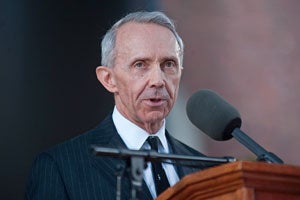In a Commencement Day speech to Harvard’s newest graduates, former U.S. Supreme Court Justice David Souter ’66 said Thursday (May 27) that judges have no choice but to interpret the U.S. Constitution beyond its plain language, and he criticized those who argue that its meaning “lies there … waiting for a judge to read it fairly.”
He said that though specific parts of the Constitution may be plainly and clearly written, judges are charged with interpreting the entire governing document. Its multiple guarantees are often conflicting and must be settled from the bench. Further, Souter said, the judicial interpretation of facts can change over time, so judges have to “understand their … meaning for the living.”
Souter said a black-and-white interpretation “fails to account for what the Constitution actually says, and fails just as badly to understand what judges have no choice but to do.” He took aim at what he termed the “fair reading” model of constitutional analysis as simplistic and prone to “discourage our tenacity … to keep the constitutional promises the nation has made.”
“The Constitution embodies the desire of the American people, like most people, to have things both ways,” Souter said. “We want order and security, and we also want liberty. We want not only liberty, but equality as well. These paired desires of ours can clash, and when they do, a court is forced to choose between them.”
Souter, who stepped down from the Court last June after 19 years, was the main speaker at Harvard University’s Commencement Exercises and received an honorary doctor of laws degree earlier in the day. In his 30-minute speech, delivered outdoors at Tercentenary Theatre during the annual meeting of the Harvard Alumni Association, Souter said there are some cases where a simple reading of the Constitution’s language suffices to settle the outcome, but those are not the cases that make it all the way to the Supreme Court.
Some cases that do make it all the way, he said, stem from open-ended guarantees made in the Constitution, such as due process and equal protection. But justices have work to do, he said, even in cases involving the Constitution’s clearest language. Souter drew from two famous cases — the Pentagon Papers case and Brown v. Board of Education — to explain his position.
[Read the full text of Souter’s speech.]
Harvard Law School Professors Noah Feldman and Jeannie Suk were both present on stage with Souter as he received his honorary degrees during the University’s morning exercises. Both Feldman and Suk clerked for Souter on the Supreme Court. [Upon Souter’s retirement, both remembered their time with Souter in a Harvard Law Bulletin tribute to the HLS alumnus.]
Justice Souter was born in Melrose, Mass., in 1939 and moved to New Hampshire at age 11. He graduated from Harvard College in 1961 and studied at Magdalen College, Oxford, as a Rhodes Scholar, after which he returned to Harvard and received a degree from the Law School in 1966.
After two years in private practice, he was named an assistant attorney general of New Hampshire, and he became the state’s attorney general in 1976. He served on the Superior Court of New Hampshire and that state’s Supreme Court before being named to the U.S. Court of Appeals for the First Circuit. Soon after, President Bush tapped Souter to replace Justice William J. Brennan Jr. on the Supreme Court.
While he was on the Court, Justice Souter was known to return whenever he could to his farmhouse in Weare, N.H., favoring hiking in the nearby mountains and quiet time for reading over the public speaking circuit.
While maintaining a low-key public profile, he developed a reputation for long hours in his chambers and careful study of the issues brought before the Court. When Justice Souter announced his intention to retire, President Barack Obama said he had shown what it means to be a “fair-minded and independent judge.”
“He approached judging as he approaches life,’’ the president said, “with a feverish work ethic and a good sense of humor, with integrity, equanimity, and compassion — the hallmark of not just being a good judge, but of being a good person.”
Last fall, Souter returned to the Harvard campus to speak in a forum moderated by Feldman. (Read the story and watch the webcast.)
— Portions of the text above were reprinted from Alvin Powell’s article in the Harvard Gazette with additional reporting by Emily Dupraz.
